Harsh weather conditions, including extreme heat and cold, significantly impact a car's battery performance and longevity. High temperatures can overheat batteries, while cold weather thickens fluid, reducing conductivity. Regular monitoring and timely replacement are crucial to avoid stranded vehicles and safety risks. Investing in a high-quality, extreme-weather-resistant battery ensures reliable performance, extended lifespan, and peace of mind. Key features to look for include high cold cranking amps (CCA), corrosion resistance, durability, weatherproofing, and smart charge systems. Regular inspection, cleaning, and optimal charging practices further enhance battery performance and longevity.
In the face of harsh weather, your car’s battery can be a weak link. Extreme temperatures, from scorching heat to freezing cold, put immense strain on these vital components, potentially leading to failure and leaving you stranded. Understanding how weather affects batteries is crucial for safe driving.
This guide explores why investing in a high-quality, harsh weather-resistant battery is essential, outlining the challenges of standard batteries and providing key features to look for when replacing it. Discover the benefits of preparedness and learn simple maintenance tips to ensure your battery’s longevity through all seasons.
- Understanding Harsh Weather Conditions and Their Impact on Car Batteries
- The Role of a High-Quality Battery in Extreme Weather
- Common Challenges Faced During Harsh Weather with Standard Batteries
- Key Features to Look for When Choosing a Harsh Weather Resistant Battery
- Benefits of Investing in the Best Battery for Severe Weather Conditions
- Maintenance Tips to Ensure Optimal Performance in All Weathers
Understanding Harsh Weather Conditions and Their Impact on Car Batteries
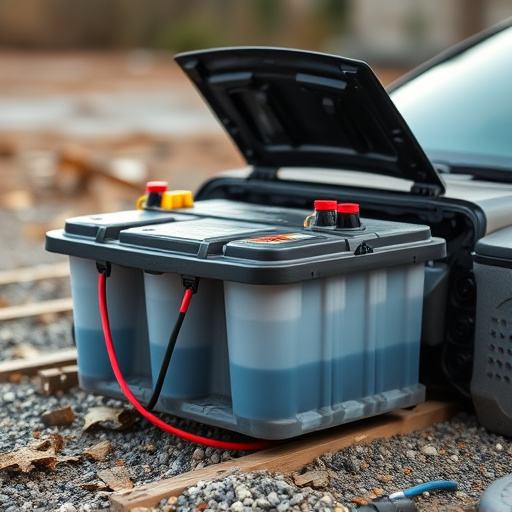
Harsh weather conditions can significantly impact a car’s battery performance and longevity, making it crucial to understand these effects before considering a replacement. Extreme temperatures, whether scorching heat or freezing cold, can cause chemical reactions within the battery to slow down or speed up abnormally, affecting its ability to hold a charge. In hot climates, batteries may overheat, leading to reduced efficiency and potential damage to internal components. Conversely, cold weather can cause the battery fluid to thicken, hindering electrical conductivity and reducing power output. Over time, these environmental stressors weaken the battery, resulting in frequent dead starts or even complete failure.
When a car battery fails in harsh conditions, it can leave drivers stranded, posing safety risks and causing inconvenience. To avoid such situations, regular monitoring of battery health and timely replacement are essential. By choosing a high-quality battery designed for extreme weather, vehicle owners can ensure reliable performance, extended lifespan, and peace of mind, especially during challenging seasonal changes.
The Role of a High-Quality Battery in Extreme Weather
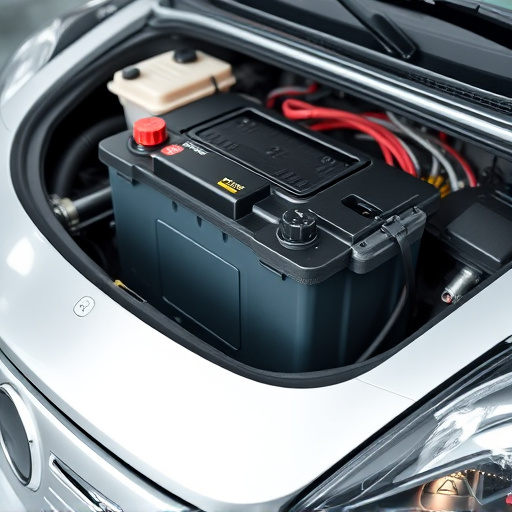
In extreme weather conditions, a high-quality battery is essential for reliable performance and safety. When temperatures plummet or soar, conventional batteries may struggle to maintain their power and efficiency. A top-tier battery, designed for harsh environments, ensures your car starts smoothly, even when left idle outdoors for extended periods. This is crucial for those living in regions with extreme climates, where cold winters or hot summers can drain battery life quickly.
Investing in a robust replacement car battery specifically tailored for such conditions offers peace of mind. It prevents unexpected breakdowns and ensures your vehicle remains operational during critical times. With advancements in battery technology, choosing the right one becomes easier, providing drivers with enhanced reliability and performance, especially when navigating through unpredictable weather patterns.
Common Challenges Faced During Harsh Weather with Standard Batteries
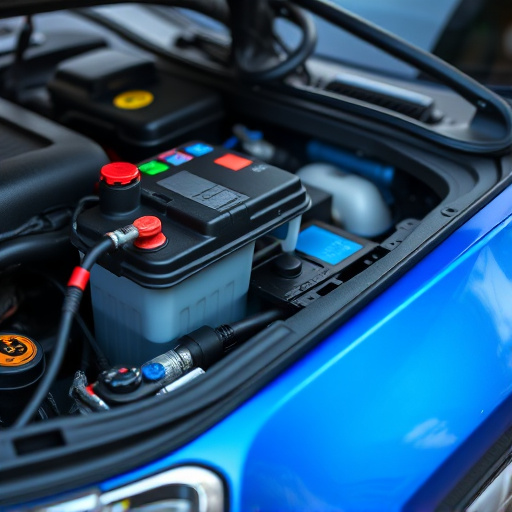
Harsh weather conditions can significantly impact the performance and longevity of standard batteries, leading to a range of common challenges for drivers. Extreme temperatures, whether scorching heat or freezing cold, can cause chemical reactions within the battery to slow down or speed up, affecting its overall efficiency. This is particularly problematic during prolonged use or when starting a vehicle in cold weather, as the battery may not have enough power to turn over the engine. Additionally, humid or wet environments can introduce moisture into the battery compartment, leading to corrosion and short circuits that hinder charging capabilities.
When a standard battery fails in harsh conditions, drivers often find themselves stranded, facing inconveniences like vehicle immobilization or longer waiting times for roadside assistance. This is especially concerning during emergencies or when traveling through remote areas with limited access to services. To avoid these issues, it’s essential to invest in high-quality batteries designed to withstand such challenges, ensuring reliable performance and peace of mind while navigating harsh weather conditions. A simple yet effective solution is to replace the car battery with a superior alternative tailored for extreme environments.
Key Features to Look for When Choosing a Harsh Weather Resistant Battery
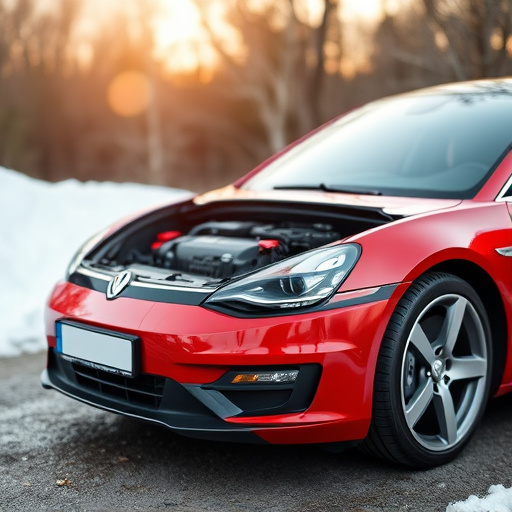
When selecting a battery designed for harsh weather conditions, several critical features should be at the top of your list. Firstly, look for batteries with high cold cranking amps (CCA). This specification indicates the battery’s performance in cold temperatures, ensuring it can start your vehicle even in icy or snowy conditions. Secondly, choose a battery with robust corrosion resistance to withstand salty roads and moisture, common during winter months. Durability is key; opt for long-lasting batteries that can handle frequent charging and discharging cycles without degradation.
Additionally, weatherproof and sealed batteries are ideal as they protect against dust, water, and extreme weather. Look for materials like ABS or polypropylene cases, ensuring the battery is shielded from external elements. A smart charge system is another valuable feature, allowing automatic voltage regulation to prolong battery life and prevent overcharging during harsh conditions. Always check for quality certifications to guarantee a reliable replace car battery solution.
Benefits of Investing in the Best Battery for Severe Weather Conditions

Investing in a high-quality, weather-resistant battery is a smart move for several reasons, especially if you live in regions with harsh climates. In extreme weather conditions, such as freezing temperatures or intense heatwaves, a standard battery might struggle to maintain its performance and longevity. This can result in unexpected breakdowns, leaving you stranded on the side of the road. A top-notch battery designed for severe weather offers enhanced durability and reliability, ensuring your vehicle starts smoothly during these challenging times.
By choosing the best battery for harsh weather, you’re not just safeguarding against occasional failures; you’re also promoting safer driving conditions. A well-maintained battery reduces the risk of a sudden stop on a cold winter morning or mid-afternoon heatwave, making your commute more predictable and secure. Moreover, it can save you money in the long run by preventing costly repairs caused by battery failure, which is often an unexpected expense during already stressful weather events. Opting for a robust replacement car battery now can prevent future headaches and keep your vehicle running smoothly all year round.
Maintenance Tips to Ensure Optimal Performance in All Weathers
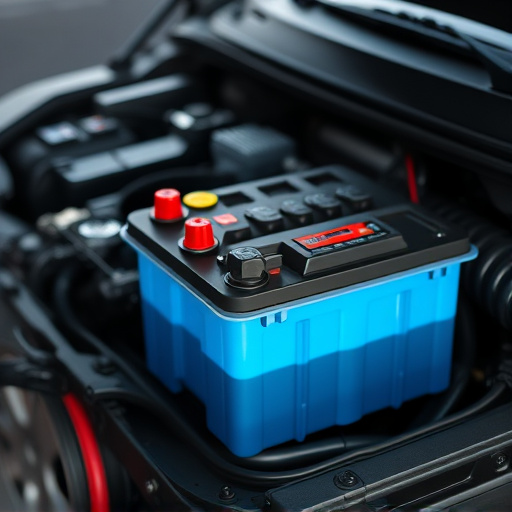
To ensure your car battery maintains optimal performance, even in harsh weather conditions, proper maintenance is key. Regularly inspect the battery for any signs of corrosion or leaks, as these can impair its functionality and reduce its lifespan. Cleaning the battery terminals with a wire brush and baking soda solution is an effective way to remove corrosion, ensuring a strong connection between your car’s electrical system and the battery.
Additionally, keeping the battery charged at an optimal level is crucial. Extreme temperatures can cause batteries to overcharge or undercharge, leading to damage. Using a voltage regulator or a smart charger can help maintain the ideal charge level, preventing excessive charging during warm weather and ensuring the battery doesn’t drain too much in cold conditions. Remember, regular maintenance, including checking the battery’s state of charge and replacing it when necessary (typically every 3-5 years), will go a long way in keeping your vehicle reliable, regardless of the weather.
When navigating harsh weather conditions, investing in a high-quality battery is crucial. By understanding the impact of extreme weather on car batteries and choosing a resilient option, you ensure reliable performance and prevent unwanted breakdowns. The benefits of a robust, severe-weather-resistant battery far outweigh the costs, offering peace of mind and long-term savings. Regular maintenance further optimizes its lifespan, making it an essential step in keeping your vehicle running smoothly throughout the year. So, when it’s time for a replace car battery, select wisely to face any weather challenge head-on.
